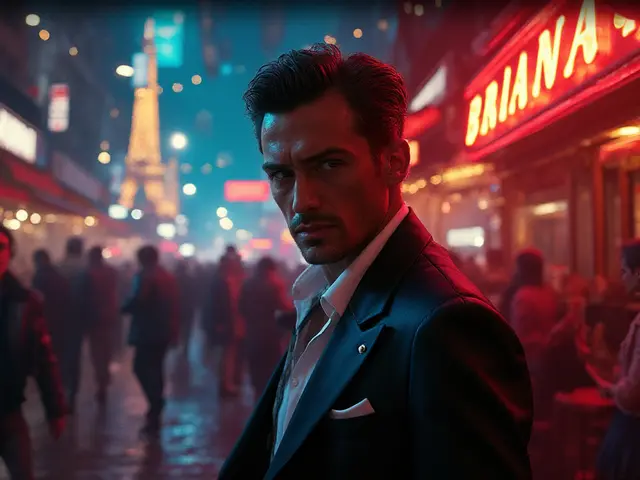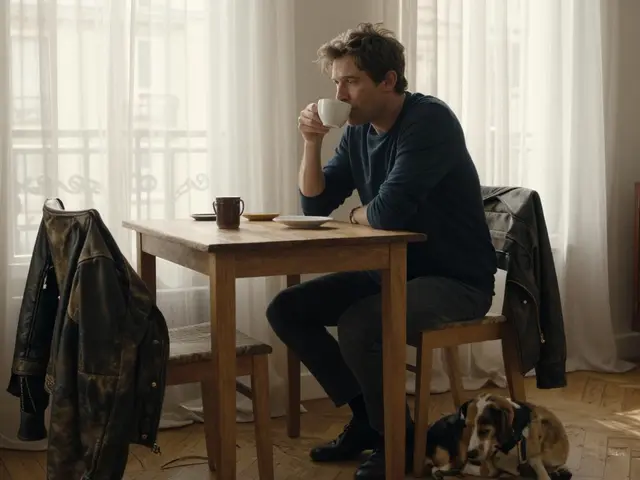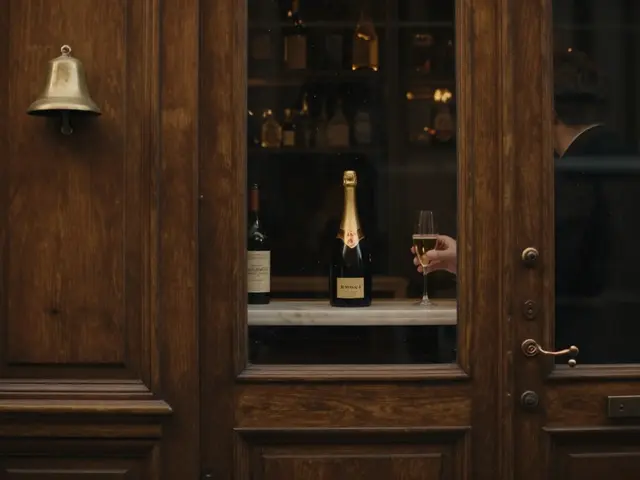
Greg Centauro didn’t just show up in Paris—he made sure people noticed. He arrived with little more than drive and a stubborn belief that you couldn’t wait for a break, you had to make one. His early days weren’t fancy. He worked odd jobs just to get by, sizing up who ran the show and what rules he’d have to bend or break. Most folks would have packed up and gone home, but not Greg. He stuck around, watching, learning, and slowly building connections in a fiercely competitive city.
If you’re trying to make it in any scene, his first move is something to steal: don’t be afraid to start small, and don’t wait for permission to try things your way. Paris rewards those who take risks, and Greg did exactly that. He started pitching bold ideas, the kind most people in the industry were too nervous to mention out loud. His knack for pushing limits didn’t just get him jobs—it made him stand out in a city packed with talent. And that’s lesson number one: get comfortable being uncomfortable if you want doors to open.
- From Hungary to Paris: The Early Hustle
- Turning Challenges into Opportunities
- Pushing Boundaries in Adult Film
- Behind the Scenes: His Work Ethic
- Lessons from Centauro’s Rise
- Leaving a Lasting Impression
From Hungary to Paris: The Early Hustle
Greg Centauro started out in Budapest, Hungary, where his life was about as far from the glitz of Paris as you can get. In the late 90s, Hungary was just starting to open up to the adult film industry, but most people in Greg’s shoes looked West for real opportunity. Greg had a plan—he wanted to tap into the bigger market and excitement that Paris promised.
Even though he didn’t have much money or any connections in France, he hopped on a train and just went for it. In those early months, Paris wasn’t easy for him. He did a bit of everything to pay the bills: waiting tables, odd jobs on film sets, even helping out with technical work just to build his French and network. While other guys hesitated to take low-paying gigs, Greg saw it as a chance to meet insiders and learn how the business really worked.
He picked up the language fast—not from textbooks, but by talking to people on set and around local bars. By 2001, he’d already scored some small roles and got noticed for his commitment and willingness to help out behind the scenes. Industry folks remember Greg as the guy who was always first to show up and last to leave. That reputation helped him get a foot in the door and set himself apart from other newcomers.
Here’s a quick look at some real numbers from Greg’s early Paris years:
| Year | Job Type | Monthly Earnings (EUR) |
|---|---|---|
| 1999 | Basic crew work | 800 |
| 2000 | Small acting gigs | 1,200 |
| 2001 | Technical & support roles | 1,500 |
The numbers aren’t huge, but every euro moved him closer to where he wanted to be. If you’re looking to break into a tight industry or a new country, Greg Centauro’s story shows that grinding through those tough, early days can lay the foundation for something way bigger. It’s about making yourself useful, learning fast, and never acting like any job is beneath you.
People in the Paris scene, especially in the Greg Centauro circle, know that hustle is more valuable than flashy talent when you’re starting out. Before the fame, it was just hard work and patience—plus a lot of conversations in terrible French. That’s what built his future success.
Turning Challenges into Opportunities
Paris wasn’t exactly a walk in the park for Greg Centauro. He was a foreigner in a tight-knit industry where trust wasn’t handed out easily. At first, producers doubted he could handle the long shooting schedules. Some even told him straight up that he wasn’t what French studios were looking for.
Instead of letting rejection slow him down, he treated every “no” as a push to get sharper. Greg doubled down on skills that people underestimated, like learning French on the job and picking up camera work. This flexibility mattered a lot—especially when a 2001 industry report showed almost half the new shoots in Paris used freelancers who could fill more than one role. Greg made sure he was always valuable.
One thing that set him apart: he listened. When directors criticized his style, he asked for specifics and actually tweaked his approach. When the city’s popular studios struggled to fill risky scenes everybody else passed on, Greg stepped up. Word spread that he’d take jobs most guys would dodge, and that built his reputation for reliability and guts.
Here’s what you can steal from Greg’s playbook if you want to turn problems into wins:
- Don’t treat tough feedback as an insult—use it as free advice for your next shot.
- Learn on the fly. Pick up new skills whenever possible, especially ones people in your field skip.
- Grab the jobs others ignore. It’s usually where your big break is hiding.
| Year | Industry Hurdle | Greg’s Move |
|---|---|---|
| 2000 | Language barriers | Learned French, expanded network |
| 2001 | Shortage of reliable talent | Offered to fill in last minute, earned trust |
| 2003 | Shift to multi-skilled teams | Picked up technical roles, not just performance |
So, if you want to carve out a spot for yourself like Greg Centauro did in Paris, pay attention to the things that slow others down—they’re usually the shortcuts nobody else sees yet. That’s how you get noticed when you’re new in town.
Pushing Boundaries in Adult Film
When Greg Centauro started making movies in Paris, he turned the local adult industry upside down. Instead of copying whatever was popular, he brought in bold, in-your-face ideas. He wasn’t afraid to ditch the polished look for something more real—or to put it bluntly, raunchy. Greg wanted to show passion that didn’t look fake or staged. That style got people talking and, more importantly, watching.
Greg Centauro also liked to experiment with shooting angles and practical effects. He used lots of handheld camera work, making scenes feel raw and up close—like the viewer was actually in the room. While his stuff wasn’t everyone’s taste, it sure got people to take notice. Some French directors at the time were all about keeping things pretty tame, but Greg made his mark with productions that went way beyond what was normal back then.
Between 2004 and 2011, Greg shot and directed over 100 films, spreading his edgy style both in France and across Europe. His series “Projet X” and “Ass Drippers” made waves, not just for their explicit content but for breaking out of the usual formula. While many films aimed for safe and repeatable, Greg’s work embraced surprises—sometimes even improvising where it made sense.
| Year | Films Directed | Popular Series |
|---|---|---|
| 2004 | 8 | Paris Sex Party |
| 2006 | 12 | Projet X |
| 2009 | 15 | Ass Drippers |
What’s the lesson for anyone trying to stand out? Greg proved that you don’t need the biggest budget or a whole crew of people to get noticed. It’s more about guts and having a fresh take. Just because something hasn’t been done before doesn’t mean you shouldn’t try. In fact, that might be exactly what gets people to pay attention.

Behind the Scenes: His Work Ethic
Ask anyone backstage in Paris about Greg Centauro, and you’ll hear the same thing: the guy showed up early, left late, and never phoned it in. He wasn’t just some flashy name in the credits—he wanted every set to look sharp, the crew to stay chill, and the actors to give their best. Greg fixed lights, wrote scripts on the fly, and even drove equipment across town when budgets got tight. That hands-on grind set him apart from others who only cared about the final shot.
A lot of directors in the French adult film scene kept distance from their teams, but Greg was different. He jumped into the mess right alongside everyone else. One camera operator said,
“Greg never saw himself above the boom guy, the makeup artist, or the new talent. He treated every job as important and made sure everyone knew their role counted.”This low-ego approach built loyalty, which isn’t something you buy—it’s something you earn with sweat and respect.
Here’s what really defined his work ethic:
- Greg Centauro rehearsed scenes until things clicked, even when everyone was dead tired.
- He was open to ideas from anyone, not just other directors.
- He balanced quality and time—he kept shooting until it was right, but didn’t let shoots drag on just for the sake of ‘perfection.’
- He always checked in with new performers, making sure nobody felt lost or ignored.
If you’re looking for a tip from his playbook, it’s this: don’t be too proud to do the grunt work. People respect that, and it often pays off in opportunities no one else gets. Greg’s way wasn’t glamorous, but it’s the reason his name still means something in Paris.
Lessons from Centauro’s Rise
Greg Centauro didn’t just carve out a place for himself in Paris—he left a blueprint for others to follow, whether you’re in the Greg Centauro business or not. His journey teaches a few powerful, practical lessons that still matter today.
First off, confidence pays off. He wasn’t especially well-connected, and he didn’t have a safety net. But he pitched himself straight to directors and producers, sometimes literally showing up at sets with samples of his work. Within just two years of arriving, he’d shot dozens of scenes and was already getting requests for larger partnerships. That’s not luck, that’s persistence—and a thick skin.
He didn’t just take every job. Greg picked gigs that challenged him or gave him something fresh to learn. For beginners, it’s tempting to say yes to everything, but he showed that a bit of selectivity actually got him further, faster. If you have goals beyond making ends meet, learn to say no sometimes.
What really set him apart was his attitude toward change. Greg was quick to pick up on shifts in demand and trends—like how the French market wanted more realistic, less polished productions in the mid-2000s. He dove into that space, helping usher in a new style. Here’s a quick look at how some of his most active years compared in terms of output and style shift:
| Year | Films Produced | Genre/Style Focus |
|---|---|---|
| 2003 | 12 | Traditional, studio work |
| 2005 | 22 | Realistic, amateur vibes |
| 2007 | 28 | Innovative themes, off-studio shooting |
He also knew networking isn’t just about schmoozing at parties. Greg built trust by showing up, being on time, and delivering exactly what he promised. A lot of people wanted to work with him just because he was reliable—a rare trait in show business.
If you’re serious about making a mark, check out what actually worked for him:
- Ask for what you want, even if it feels awkward.
- Say yes to experience, but know when a job won’t get you closer to your goals.
- Adapt your style when audiences or markets shift.
- Stick to your word—sometimes showing up is the edge.
It’s not rocket science, but it does take guts and patience. Greg proved you don’t have to be born into a scene to break into it. The mix of hustle, honesty, and picking up on what’s around you is what got him from newcomer to Paris mainstay.
Leaving a Lasting Impression
If you ask anyone who worked with Greg Centauro in Paris, the same thing comes up: he didn’t just pass through—he changed the game. His sets were famous for their energy, clear direction, and yes, plenty of laughter. People filtered in from all over Europe, hoping to get a chance to work with him, because they knew his shoots got noticed far beyond France’s borders. By 2010, Greg had directed or acted in over 200 productions. That’s a pace few could match, and his name was attached to some of the most-watched scenes on local streaming platforms at that time.
One of the ways he left a lasting mark was by blending French storytelling with the faster-paced, edgier style he picked up back in Hungary. This mix set a new standard for what people expected in Paris adult films. Other directors started copying his style, even if they wouldn’t admit it out loud. Greg’s insistence on quality over quantity also pushed budgets up all around him—talent knew if they shot with him, the finished work would look better and probably sell better, too.
Numbers really show what he did:
| Year | Films Directed | Award Nominations |
|---|---|---|
| 2006 | 22 | 3 |
| 2008 | 38 | 6 |
| 2010 | 44 | 5 |
Greg’s network grew fast as well. He didn’t isolate himself—instead, he gave new talent a shot, and a bunch of them went on to headline in their own right. He knew Paris was all about quick buzz and lasting clout, so he never got too comfortable. By 2011, he was getting calls to consult for companies in Germany and the UK, definitely not the norm for a Paris-based director at the time.
If you want to leave your own stamp on a crowded field, take a page from his playbook:
- Get hands-on. Greg didn’t just bark orders; he worked every job on set at least once.
- Mix styles. He wasn’t afraid to blend influences and shake up the local flavor.
- Support your crew. Giving others a leg up came back to him every time in the form of loyalty and new opportunities.
- Be everywhere. Greg hustled to get his work seen across Europe, not just in local clubs or scenes.
To this day, the Greg Centauro approach is a go-to reference when up-and-comers talk about breaking the mold in Paris. That’s not by accident; that’s what happens when you stay bold, stay real, and never stop moving forward.








